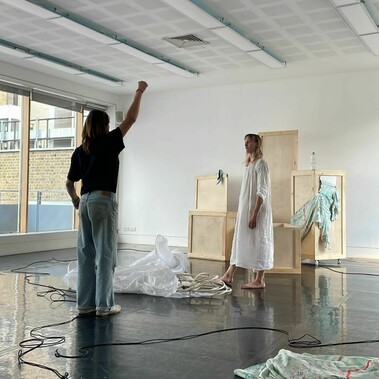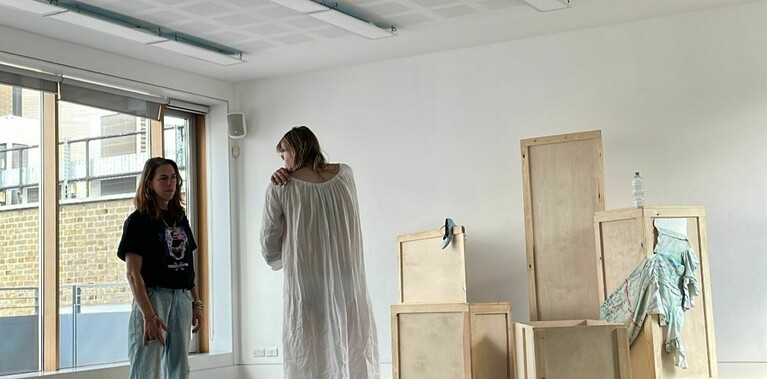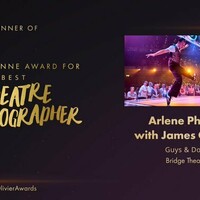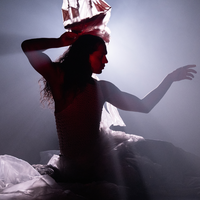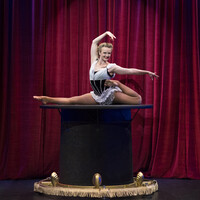Behind the creation of Anders Duckworth's Mapping Gender

News Story
Written by Emma Frankland.
I’ve been working on and off with Anders Duckworth on their work Mapping Gender for the past year. I have been working in the role of dramaturg, which is a really exciting job.. albeit one that can mean different things to different people!
For me, being a dramaturg is, first, about understanding what the artist wants to say - what are the heart, guts and soul of a show? Then acting as a memory of this - reflecting and questioning the artist to remind them of where they hoped to be and why the project exists, whilst also allowing it to grow and be surprising. I feel that the dramaturg has a responsibility to pay attention to what stories the work is telling.
It’s essential to have a trusted voice offstage when the creator of a piece is also within it and performing - as Anders is. And so, building that trust becomes part of the journey also - of holding more than just the action onstage. I feel there is a dramaturgical responsibility to consider how the work affects the other people in the room and what is being put into the world. What responsibility do we have to each other to create a space that is safe to explore within rehearsal - and also to then share with others - eventually, our audience!
I’m a trans feminine person, and I think for this project that has been really essential too. In the current moment we see many more trans artists being supported to create work and explore our stories and this is vital - but what I also experience is that oftentimes these are stll productions supported (with good intentions) by cis people, within the structures of cis led organisations.. So, having multiple trans voices in addition to the performing artist is essential to create a safer space to discuss these themes.
The concept of Mapping Gender has been at times an ugly and difficult one to understand.
There is something violent in the early aesthetic choices that were made. The costume evokes a period of active European colonial expansion. The concept of mapping is inextricably linked to the theft of land and the policing of free movement enacted by our ancestors that is still enforced today.
The costume is a beautiful dress, but the femininity it symbolises is not universal - it is white feminism, the aesthetic of the colonisers. The aesthetic of white supremacist systems that Anders and I have personally benefited from as white artists within an inherently racist industry.
Our trans and queerness does not grant us immunity from complicity? How can we ethically talk about borders while benefiting from the systems imposed by them?
So one act of the dramaturgy and creative process has been to acknowledge these questions and then allow them to inform and lead the work.
A common arc within trans stories is that of repression and disassociation from one’s body - and so the attempt to map something as intangible as a gender became also a way of recognising the violence and absurdity of the act of mapping the earth. It feels inconceivable that one could draw borders across bodies of water, through solid mountains, living cities - the quest to map a gender, just as futile.
We realised that Anders could shed their costume, but it was important not to imply that this act in itself was the solution. So the path the show weaves is less linear. It isn’t about freeing oneself from a restrictive gender binary and therefore becoming free of responsibility. Nor is it about ignoring the seductive power that lies on offer within normative gender expression - it’s about recognising the contradictions of a structure that restricts everyone but also empowers some.
There’s a quote that I love from Edward Albee - ”Sometimes a person has to go a very long distance out of their way, in order to come back a short distance correctly.”
I believe the job of a dramaturg is to ensure that the very long distance is travelled.
Emma Frankland is an award-winning live performance and theatre artist from Cornwall. Visually stunning and playfully destructive, her practice often focusses on politically motivated performances exploring issues of gender and identity.
“Emma Frankland is the punk rock angel of your dreams and nightmares…” (The Stage)
Visit Emma's website.
